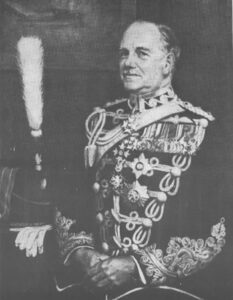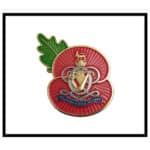Address by Air Marshal Sir Victor Goddard.
It is customary to call occasions of this sort, Memorial Services but to treat them as a time for thanksgiving – thanksgiving to the Spirit of Good; that is, to God, for the example of a man for whose real goodness we are truly grateful.

Before I remind you of some of the reasons for gratitude which we share when we think of Jack Baldwin, I am going to express thanks on behalf of all the rest of us, to those devoted officer-colleagues of his in the 8th King’s Royal Irish Hussars, a regiment which is now known as the Queen’s Royal Irish Hussars. For it is by their wish and generosity that this Service is now taking place at all, and in this Church which is so imbued with the spirit of the Royal Air Force.
You may have known another man with goodness as buoyant and brilliant as Jack’s. I have not. And of one thing, I’m pretty sure: Jack would have been about the last man to think about a Service like this being given in honour of him and ingratitude. If he ever was told of the possibility of this Service being held – for it used to be the custom of the Air Force to thank God for and pray for its departed leaders – he might have said, “God forbid!” But now, I feel sure he welcomes the love, gratitude and understanding that you all bring to this place today, and I confidently suppose that even his modesty no longer stands in the way of recognising those feelings for the fact that he had, and that he constantly exercised, courage, bonhomie and cheerful understanding towards all kinds of people and situations. Those gifts, with other great qualities of the sunniest kind, enabled Jack Baldwin to be the leader that he was.
It is the mark of a young man’s panache, love of adventure and comradeship that he chose to go for a King’s commission in the Hussars – the very name of that regiment suggests gaiety in the face of danger and death. And it was, in great part, his aspiration to extend the reconnaissance power of the Cavalry that he applied for a transfer to the Royal Flying Corps when World War I came upon us. He was the kind of pioneer who would not have admitted to being one when, at his own expense and with no safeguards but his God-given faith and skill – the best of safeguards in reality – he went flying in 1911 and so became a pilot.
At about the same time as Jack transferred to the R.F.C. knowingly, intentionally, prepared, I was transferred from the Fleet to the R.N.A.S. unknowingly, unintentionally; so I can well appreciate the fact he had developed his gift of the initiative. You will not want a catalogue of Jack’s progress and prowess in any of his many fields of action on Air Force Service or, for instance, as the Captain of the Air Force Hockey Team. Although we were both flying over the Battle of the Somme, it was not until years later, when he was AOC, the Cadet College, Cranwell, and incidentally, Master of the Carswell Hunt, that I first met that happy man. I was visiting Cranwell – his command – for one night only, to talk to the cadets after dinner in their mess. The next morning I went to Jack’s office to report and then depart. He was resplendent in hunting pink. After a brief and joyful chat, he rode away to the Meet.
We served together in India at the end of his career. On arrival at Delhi, I reported to him and joined his Headquarters. He was then acting as the Air Force Commander-in-Chief. That was before he took command of the Third Tactical Air Force which so greatly helped to win the war in Burma; that was after he had relinquished his command of No . 3 Bomber Group in England.
You may remember that Jack had at least three claims to fame in the application of Air Power in war – claims which he never cited. He was one of the pioneers of Trenchard’s Independent Air Force in 1917-18 – the origin, really, of the Royal Air Force as a separate service. In World War II he acted for a while as Commander-in-Chief of Bomber Command which he, in fact, had pioneered in 1917. Meanwhile, as AOC of No. 3 Bomber Group, he personally took part in the famous ‘Thousand Bomber Raid’.
We all owe thanks for the love and loyal support which Jack’s wife, Betty, gave to him through much of his adventurous life. It was through their wartime home at Newmarket, and their daughter, Pamela, that the tribute which I am about to quote came. It takes us back to that time of the ‘Thousand Bomber Raid’ and reflects some of the delightful characteristics of her father for which we are here to thank God most cheerfully and gratefully.
Pamela Fitzwilliams wrote:
“He had a very quick wit and was always ready to see a joke. He had that way of being able to lead people; that broad view which made him a good counsellor and adviser – a good judge of character – quick to appreciate another point of view and to sum up a situation. A great ability to work – but also with the same enthusiasm he was able to turn from his work and enjoy his relaxation – which in his prime of life was generally active – he was an all-around sportsman and always on the ‘go’. He had a great gift of being able to talk with anyone and everyone. In fact, he worked hard, played hard and enjoyed life and what life had to offer. I was staying with him for the weekend, the time he went to ‘have a look’ at Germany. He told me casually, “I am going over tonight”. I said, “What happens if anyone phones?” “Just tell them I’m out!” Then I realised he just hated sending his ‘boys’ over not knowing what it really felt like, so much had changed since his wartime flying. He just had to know what they had to deal with.”
When World War II was over and Jack was on the Retired List, the 8th Hussars needed to appoint a Colonel of the Regiment. Exceptionally, because he was so exceptional a man, they invited Air Marshal Sir John Baldwin to hold that appointment. Numerous other interests who are represented here today also sought and gained his aid and wisdom; in business, in public service and again in the service of the Crown as Deputy Lieutenant of Lincolnshire. It is because of the gratitude of the 8th Hussars to Jack (and to his gallant son who was killed in battle while serving in that same regiment) that we are here today. And we must also thank his granddaughter, for organising us.
We don’t know where Jack is now. Many of us may feel the presence of his gay spirit with us here. I like to suppose that he would now say to my question of his whereabouts, “Just tell them I’m with you” – he knows now more than we do about the reality of life: life, his gay speciality and triumph, thank God!



